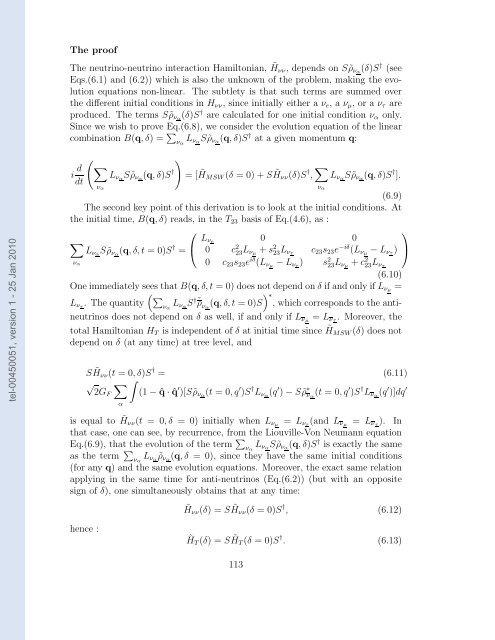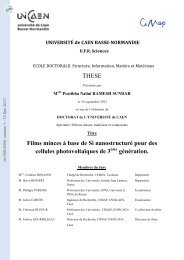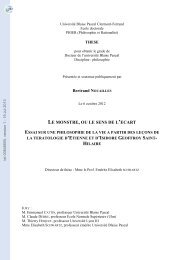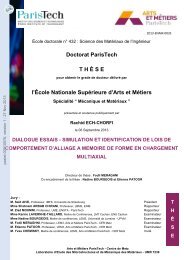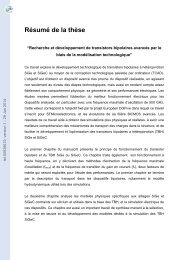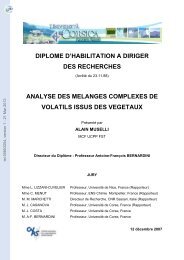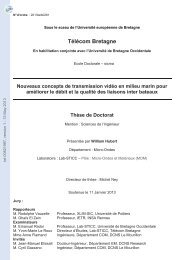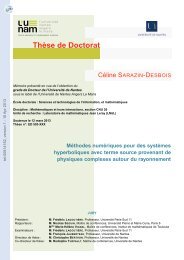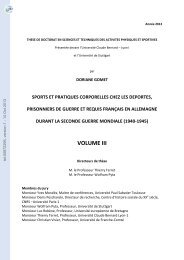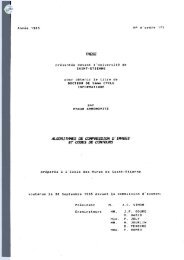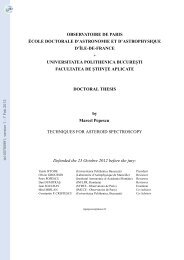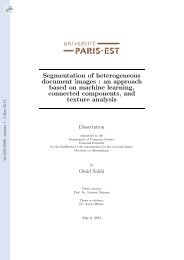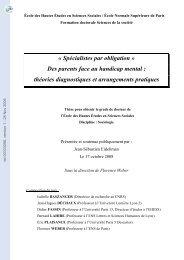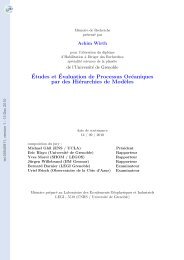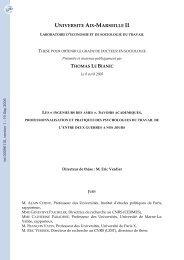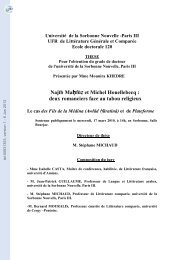Etudes des proprietes des neutrinos dans les contextes ...
Etudes des proprietes des neutrinos dans les contextes ...
Etudes des proprietes des neutrinos dans les contextes ...
Create successful ePaper yourself
Turn your PDF publications into a flip-book with our unique Google optimized e-Paper software.
tel-00450051, version 1 - 25 Jan 2010<br />
The proof<br />
The neutrino-neutrino interaction Hamiltonian, ˜ Hνν, depends on S˜ρνα(δ)S † (see<br />
Eqs.(6.1) and (6.2)) which is also the unknown of the problem, making the evolution<br />
equations non-linear. The subtlety is that such terms are summed over<br />
the different initial conditions in Hνν, since initially either a νe, a νµ, or a ντ are<br />
produced. The terms S˜ρνα(δ)S † are calculated for one initial condition να only.<br />
Since we wish to prove Eq.(6.8), we consider the evolution equation of the linear<br />
combination B(q, δ) = <br />
να LναS˜ρνα(q, δ)S † at a given momentum q:<br />
i d<br />
<br />
<br />
LναS˜ρνα(q, δ)S<br />
dt<br />
να<br />
†<br />
<br />
= [ ˜ HMSW(δ = 0) + S ˜ Hνν(δ)S † , <br />
LναS˜ρνα(q, δ)S<br />
να<br />
† ].<br />
(6.9)<br />
The second key point of this derivation is to look at the initial conditions. At<br />
the initial time, B(q, δ) reads, in the T23 basis of Eq.(4.6), as :<br />
<br />
LναS˜ρνα(q, δ, t = 0)S<br />
να<br />
† ⎛<br />
Lνe 0 0<br />
= ⎝ 0 c2 23Lνµ + s2 23Lντ c23s23e−iδ (Lνµ − Lντ)<br />
0 c23s23eiδ (Lνµ − Lντ) s2 23Lνµ + c2 ⎞<br />
⎠<br />
23Lντ<br />
(6.10)<br />
One immediately sees that B(q, δ, t = 0) does not depend on δ if and only if Lνµ =<br />
Lντ. The quantity να LναS †˜ρ<br />
∗ να (q, δ, t = 0)S , which corresponds to the anti<strong>neutrinos</strong><br />
does not depend on δ as well, if and only if Lνµ = Lντ. Moreover, the<br />
total Hamiltonian HT is independent of δ at initial time since ˜ HMSW(δ) does not<br />
depend on δ (at any time) at tree level, and<br />
S ˜ Hνν(t = 0, δ)S † = (6.11)<br />
√ <br />
<br />
2GF (1 − ˆq · ˆq ′ )[S˜ρνα(t = 0, q ′ )S † Lνα(q ′ ) − S˜ρ ∗ να (t = 0, q′ )S † Lνα(q ′ )]dq ′<br />
α<br />
is equal to ˜ Hνν(t = 0, δ = 0) initially when Lνµ = Lντ(and Lνµ = Lντ). In<br />
that case, one can see, by recurrence, from the Liouville-Von Neumann equation<br />
Eq.(6.9), that the evolution of the term <br />
να LναS˜ρνα(q, δ)S † is exactly the same<br />
as the term <br />
να Lνα ˜ρνα(q, δ = 0), since they have the same initial conditions<br />
(for any q) and the same evolution equations. Moreover, the exact same relation<br />
applying in the same time for anti-<strong>neutrinos</strong> (Eq.(6.2)) (but with an opposite<br />
sign of δ), one simultaneously obtains that at any time:<br />
hence :<br />
˜Hνν(δ) = S ˜ Hνν(δ = 0)S † , (6.12)<br />
˜HT(δ) = S ˜ HT(δ = 0)S † . (6.13)<br />
113


